- Home
- Herbert Strang
Fighting with French: A Tale of the New Army Page 14
Fighting with French: A Tale of the New Army Read online
Page 14
CHAPTER XIV
THE HIKIOTOSHI
The village appeared to be full of wounded. Some were being attended toby doctors on the spot, others were sent to the rear in motor ambulancesas fast as these could be brought up. The Rutlands learnt that theirattack on the village had been only one incident in operations that hadextended for several miles along the front, and which had resulted in acertain gain of ground. The German trenches had been stormed, and theenemy thrown back for a considerable distance.
During the morning a motor despatch rider came in with a message fromthe general of division. An immediate answer was required, whichColonel Appleton at once proceeded to write, while Captain Adamsquestioned the cyclist on what he had seen in the course of his ride.The divisional headquarters was at a village some fifteen miles to thenorth-east as the crow flies, but the route taken by the cyclist, wellbehind the British lines, was almost twice that distance. He had beeninstructed to return the same way. It occurred to Captain Adams,however, that much time would be saved if a more direct route werefollowed, and he suggested that the colonel should take advantage of thechange in position resulting from the forward movement and the confusionin the German lines, to send his message along a road that ran from thecaptured village in the rear of what had been the enemy's trenches.
"That's all very well," said the colonel, "but in the first place thisman is ordered to go back the same way, and in the next we have no othercycles or cyclists."
"We have a couple of cycles," said the captain. "Don't you remember,sir, we sent a requisition to the base for a couple of new machine gunsand by some blunder or other they sent us two motor cycles instead?"
"And we still have them?"
"Oh yes! We shall have to keep them until someone discovers that theyare missing and ultimately finds out their whereabouts. And I've nodoubt we've several men who can ride."
"There's a further consideration. The road you mention is now betweenour firing line and the enemy's. It will be decidedly unhealthy."
"A little risky, no doubt; but by all accounts the Germans have beenthrown back some distance, and they'll be too busy consolidating theirnew position to be very dangerous to-day. I daresay there'll be snipershere and there, but they're not very successful at running targets. I'dsuggest that you triplicate your despatch: send one copy by this man thelong way, and two at short intervals by the direct road. You'd makesure of it thus."
"Well, I'll 'phone to the front and discover how the land lies. In themeantime see if you can find riders. If it appears reasonably safe I'lladopt your suggestion: it will save half an hour or more."
The captain at once hurried to the Bonnards' cottage. "Amory's a likelyman," he thought.
The upshot was that when the official despatch rider was returning toheadquarters by the long way round, Kenneth and Harry were speedingalong the road north-eastward. Harry was the first to start; Kennethfollowed at a minute's interval, just keeping his friend in sight. Theirorders were to let nothing interfere with or delay the delivery of thedespatch. If any accident happened, if either of them was hit by asniper's bullet, there must be no question of helping the other.
Before starting they had attentively studied a large-scale map of thedistrict. The colonel's information had shown the impossibility ofattempting to reach headquarters without leaving the direct road. Thislay, for about half the distance, between the new fronts of the opposingforces, but it then crossed the new position which the Germans werebelieved to be entrenching, and ran for several miles behind it. Therewas, however, a by-road forking to the left just before the halfwaypoint was reached, and this opened into a bridle track leading in theright direction. By making this slight detour they would lose a mile ortwo, but they might hope to incur no more danger than they were bound torisk in the early part of the journey.
"Barring accidents, we shall save a good deal more time than the colonelthinks," said Kenneth, as he folded the map. "The way the other fellowhas gone is sure to be congested with traffic: this will be clear."
"I hope so," replied Harry, "but don't forget there's been an action.The road is probably half pits. Well, I go first then; if I come acropper, take warning and scoot."
At the outset the road was not so bad as he had expected, and he wasable to run the machine at a pace of nearly forty miles an hour withoutmuch risk. There were few marks of gun fire, no doubt because the roadfollowed the bottom of an indentation over which the shells had passed.But after a time it rose, and the ground fell away on each side, andHarry was warned of the necessity of reducing speed by a sudden joltthat made him bite his tongue. From that moment he had to watch everyyard of the road. Sometimes on the left, sometimes in the centre,sometimes on the right, yawned a shell pit deep enough to bury a wagon.Presently he had to pick his way through a litter of broken rifles,helmets, haversacks, all sorts of articles of equipment, evidentlydropped or thrown aside by the Germans in their disordered flight theday before. Time was so important that, even now, he rode at a speedthat would have seemed lunacy to a motorist with a proper respect forsprings and bearings, avoiding only dangerous holes, and riding overmost of the obstacles. His progress was a succession of jolts and jerksthat threatened to dislocate the machine, and he afterwards wonderedthat it had not broken down under the strain.
He came into the by-road. This, being at a lower level than the road hehad left, had not suffered so much from shells; on the other hand, itwas scored with ruts and soft with mud, into which the wheels now andthen sank several inches. He was beset now by a constant fear ofskidding, and annoyed by splashes of mud on his face.
"It might be worse," he thought. "Lucky they are not bullets."
So far, it was clear, he had not been seen by the snipers whom CaptainAdams had mentioned as the greatest risk of the journey. The ground oneither side rolled away in gentle undulations. There was neither housenor living creature in sight. Guns were booming in the far distance,but though he knew that there were thousands of invisible soldiers oneach side of him, nothing on the face of the country indicated a stateof war.
Topping a rise, he came to a ruined hamlet in which not a single cottagewas whole. Beyond this branched the bridle track that led to hisdestination. It was a lane no more than four feet wide, between hedges,and thick with slimy mud. It wound and twisted in an erratic andseemingly purposeless manner, and but for the evidence of the map he hadconned Harry would have had no confidence in its general direction.
Suddenly he heard the characteristic scream of a shell not far ahead.Immediately afterwards the deep boom of a heavy gun came from his right.The German gunners had started work. In a few seconds there was rollingthunder on each side of him; it was evident that a violent artilleryduel was in progress. The hedges prevented him from seeing anything;but reflecting that the gunners were aiming at each other's positions hewas not disturbed about his own safety.
He had just turned an awkward corner, narrowly avoiding a sideslip, andwas congratulating himself on a few yards of straight track and awidening that gave hope of reaching an open road, when, amid the soundof guns, he caught another sound, which at first he mistook for thewhirr of an aeroplane. In a moment, however, he recognised his error.It was the purring of a motor bicycle, and in front, approaching him.Almost as soon as he knew this, the machine came in sight at the farcorner, perhaps a hundred yards away, running at no great speed. At thefirst glance he saw that the rider was a German; at the second that theGerman was not unprepared to meet him. He realised afterwards that, thewind being with him, the noise of his own swiftly running engine musthave been heard first.
Each had only a few moments to decide what to do. The German, theinstant he recognised the approaching rider as a British soldier,screwed on his brakes, turned the bicycle across the lane, sprang offand drew a revolver, no doubt expecting that the Englishman would swerveat the obstacle, be forced into the hedge, and present an easy target.His reasoning, if su
ch it was, would have been sound enough had it notproceeded from a faulty estimate of the English mind--an error intowhich the Germans have been betrayed many times since the Kaiser madehis initial blunder in the same kind. The German is a master of theobvious, and imagines that what he would do is the best thing to bedone, and that an Englishman will do it badly.
Harry, however, was not committed by training or habit to either of theobvious courses: to allow himself to be forced into the hedge, or tostop dead and fight the German on foot. It seemed to him, in those fewseconds that he had for deciding, better to clear the way for Kenneth,who, no doubt, was not far behind. A spill would at any rate not hurthis feelings, as it might a German's. Accordingly, instead of applyingthe brakes, he opened the throttle, and bracing himself for the shock,drove his machine at ever-increasing speed straight for the enemy.
This, of course, from the German point of view, was English madness.Still, it was unexpected, and when the German fired, at the distance oftwenty paces, his aim was flurried by his natural surprise, and by thesudden realisation that his machine would certainly be smashed.Dropping his revolver, and shouting something that was far fromcomplimentary, he tried to pull his bicycle clear; but his action wasnot only too late; like so many well-meant efforts to prevent mischief,it furthered it. His movement of a few inches caused Harry's bicycle tostrike the hub of the driving wheel instead of the middle of themachine, for which he was steering. Harry was flung over thehandle-bars into the hedge, a few feet in advance of the bicycles, whichlay mangled together, and not quite so far from the German, who had veryluckily escaped being crushed beneath them.
The two men staggered to their feet almost at the same moment, bruisedand shaken, but equally unconscious of their hurts. The German, withhis cultivated instinct, fumbled for his revolver, remembered it was onthe ground out of reach, and was drawing his sword-bayonet when Harry,in the British way, flung himself upon him. And when Kenneth, half aminute later, drawn up at speed by the sound of the crash, came upon thescene, he beheld with mingled amazement and concern two militaryfigures, begrimed with mud, struggling on the ground. The figure ingrey was undermost.
"Go on!" shouted Harry. "I've got the Hikiotoshi on him."
Kenneth had slowed down, but remembering the captain's injunction, andseeing that his friend was well able to take care of himself, he openedout and in a few seconds was pushing along at as high a speed as thegreasy lane permitted. He could not help smiling at the recollection ofhis own bewilderment and naive indignation when, in one of his earlylessons in jujutsu from Mr. Kishimaru, he had found both legs suddenlyswept from under him, and heard the Japanese, beaming down upon him,gently remark:
"That, my dear sir, is the Hikiotoshi."
Kenneth's experiences along the road had been identical with Harry's.But a few seconds after he had left the scene of the collision he hadreason to wonder, for the first time, whether he would ever reach hisdestination. The bridle track opened into a road that intersected astretch of plain. It had suffered hardly at all from shells; being on ahigher level than the bridle track it was fairly dry and gave a bettersurface for riding; but it was fully exposed on either hand, withoutprotection of hedge or dyke; and anyone passing along it must be in fullview for a considerable distance left and right. And Kenneth found thathe had run into the very centre of the artillery duel the sounds ofwhich he had heard for some minutes. Shells whizzed over his head inboth directions. Bang to the left of him, boom to the right of him, andabove him shriek and moan in various tones. And in the midst of thebroken sounds came the continuous hum of an aeroplane somewhere in theneighbourhood.
Neither the German nor the British batteries were visible. Kennethindeed did not look round for their flashes or the smoke from thebursting shells. Bending forward over the handle-bars he raced on,congratulating himself that, his course being probably midway betweenthe distant batteries, the gunners on each side were too intent onsearching the hostile position to concern themselves about a solitarycyclist careering across their front at a shorter range. But he knewthat between him and the guns infantry were watching in their trenches,perhaps awaiting the order to advance, and at any moment he might findhimself caught between two fires.
He was not long left in doubt whether he had been seen. From the righta bullet sang across the road. It was a single shot, from the rifle ofsome sniper concealed somewhere in advance of the German lines. At aspeed of fifty miles an hour he must be a difficult target even for themost expert of marksmen, and he hoped that speed would save him.Another shot whistled by his ear; that was a narrow escape, he thought;but there had been no volley from the German trenches: apparently he hadnot been seen except by the sniper, and it was only a stream of shotfrom rifles or machine guns that he had to fear.
Presently, however, he was startled by a loud explosion near at hand onhis left; glancing round, he saw a column of earth and smoke rise fromthe ground. "That's a shell from a field-gun," he thought. "TheGermans have spotted me, and are trying their hand." Another shellburst on his right, close enough to bespatter him with earth. A fewseconds afterwards there was a shattering explosion on the same side, ofsuch force that the concussion of the air alone was sufficient to hurlhis machine sideways. Uncontrollably it mounted a low bank on the left,jumped a ditch, tore a furrow through the heavy soil, then stoppedslowly and turned over.
Kenneth picked himself up, covered with dirt but unharmed. He looked atthe fallen machine. Both wheels were buckled; from one the tyre hadbeen ripped off; the bicycle was damaged beyond repair. A shellbursting within a hundred yards sent him scrambling into a ditch, wherehe rested for a few moments to collect himself. The German gunners wereapparently satisfied; the firing ceased.
"Scuppered, and with only a few miles to go," he thought. "Both of us!The long way will prove to be the shortest after all."
After a little consideration he came to the conclusion that there wasstill a chance of arriving first at headquarters by making his way alongthe ditch parallel with the road. In any case he must attempt it, forthe third rider might have met with an accident: his clear duty was togo on and deliver the despatch. He was farther from his destinationthan he supposed, and it would probably have taken him an hour to reachit on foot. But he set off along the bottom of the ditch, sinkingsometimes over his ankles in slime and water.
Some twenty minutes afterwards he was surprised to hear another seriesof explosions on the road behind him. A little later the wind carriedtowards him the purr of a motor bicycle. It was rapidly approaching;the crash of bursting shells came nearer and nearer. Was the rider afriend or an enemy? It could not be either Harry or the German he hadmet, for he had seen at a glance as he passed by that their machineswere crippled. He was bound to be discovered; the ditch, while deepenough to conceal him from the gunners in the distance, would not hidehim from anyone passing along the road, even if he lay flat in thefilthy ooze. He drew the revolver which Captain Adams had lent him,resolving to get his shot in first.
Only a few seconds elapsed between his hearing the sound and theappearance of the bicycle round a curve in the road behind. The riderwas in khaki; he was flat over the handle-bars; the machine seemed toleap along the road. It flashed by, and Kenneth, crouching over theditch, was amazed to see that the rider was Harry. Whether his friendhad recognised him he could not tell. Quite oblivious of the shellsthat were still bursting on and near the road, he watched the bicycle'sbreakneck career until it passed under a bank that protected it from theGerman guns, turned a corner, and disappeared. Next moment there was acrash behind him; he was conscious for the fraction of a second of sharpblows on every part of his body; then he knew no more.

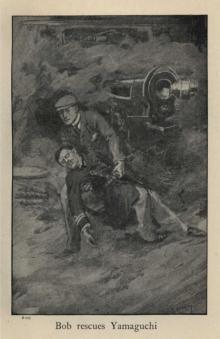 Kobo: A Story of the Russo-Japanese War
Kobo: A Story of the Russo-Japanese War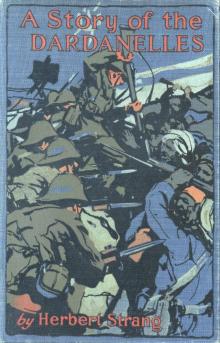 Frank Forester: A Story of the Dardanelles
Frank Forester: A Story of the Dardanelles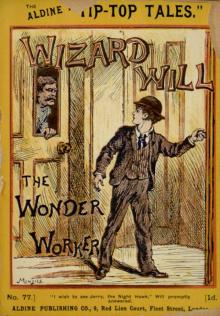 Wizard Will, the Wonder Worker
Wizard Will, the Wonder Worker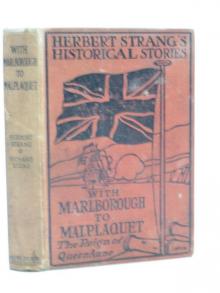 With Marlborough to Malplaquet: A Story of the Reign of Queen Anne
With Marlborough to Malplaquet: A Story of the Reign of Queen Anne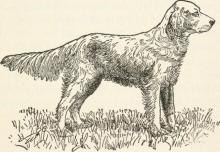 The Dogs of Boytown
The Dogs of Boytown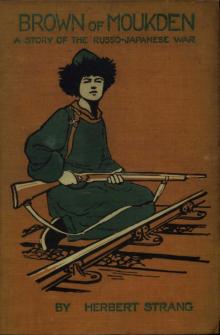 Brown of Moukden: A Story of the Russo-Japanese War
Brown of Moukden: A Story of the Russo-Japanese War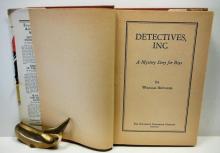 Detectives, Inc.: A Mystery Story for Boys
Detectives, Inc.: A Mystery Story for Boys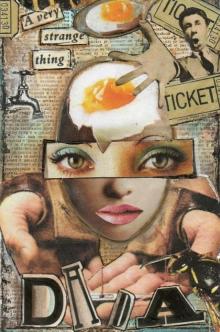 Bright Ideas: A Record of Invention and Misinvention
Bright Ideas: A Record of Invention and Misinvention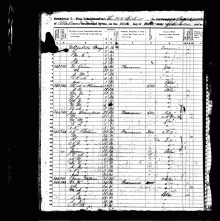 Lost in the Cañon
Lost in the Cañon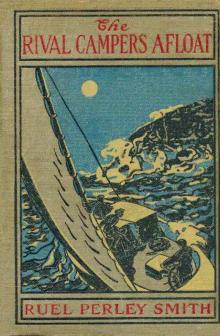 The Rival Campers Afloat; or, The Prize Yacht Viking
The Rival Campers Afloat; or, The Prize Yacht Viking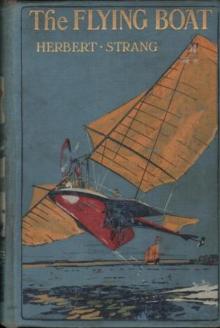 The Flying Boat: A Story of Adventure and Misadventure
The Flying Boat: A Story of Adventure and Misadventure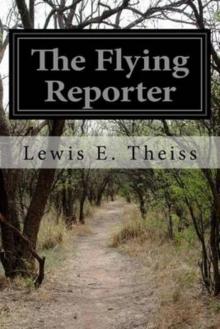 The Flying Reporter
The Flying Reporter Jack Hardy: A Story of English Smugglers in the Days of Napoleon
Jack Hardy: A Story of English Smugglers in the Days of Napoleon No Man's Island
No Man's Island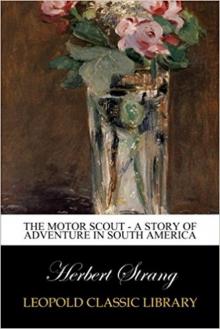 The Motor Scout: A Story of Adventure in South America
The Motor Scout: A Story of Adventure in South America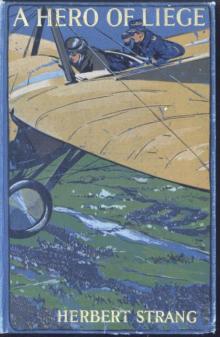 A Hero of Liége: A Story of the Great War
A Hero of Liége: A Story of the Great War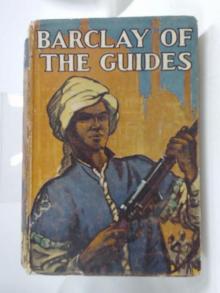 Barclay of the Guides
Barclay of the Guides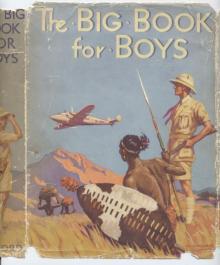 Carry On! A Story of the Fight for Bagdad
Carry On! A Story of the Fight for Bagdad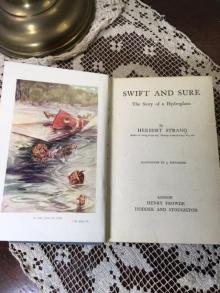 Swift and Sure: The Story of a Hydroplane
Swift and Sure: The Story of a Hydroplane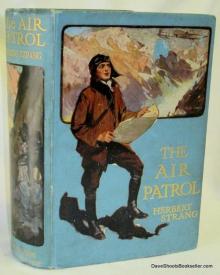 The Air Patrol: A Story of the North-west Frontier
The Air Patrol: A Story of the North-west Frontier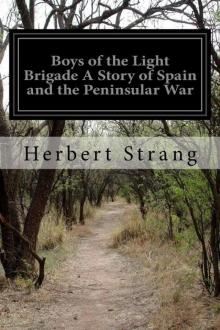 Boys of the Light Brigade: A Story of Spain and the Peninsular War
Boys of the Light Brigade: A Story of Spain and the Peninsular War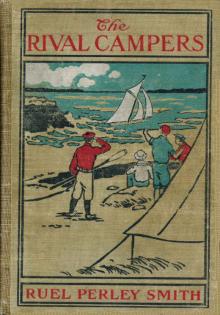 The Rival Campers; Or, The Adventures of Henry Burns
The Rival Campers; Or, The Adventures of Henry Burns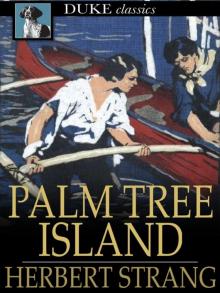 Palm Tree Island
Palm Tree Island The Friends; or, The Triumph of Innocence over False Charges
The Friends; or, The Triumph of Innocence over False Charges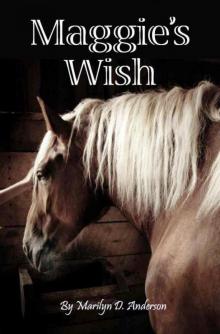 Maggie's Wish
Maggie's Wish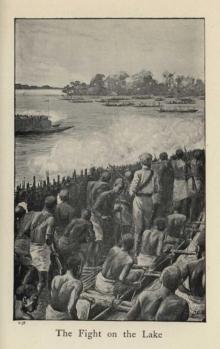 Tom Burnaby: A Story of Uganda and the Great Congo Forest
Tom Burnaby: A Story of Uganda and the Great Congo Forest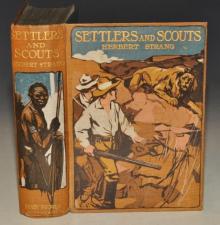 Settlers and Scouts: A Tale of the African Highlands
Settlers and Scouts: A Tale of the African Highlands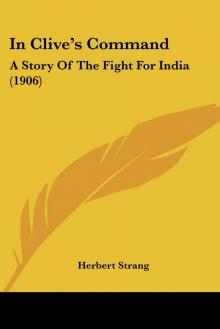 In Clive's Command: A Story of the Fight for India
In Clive's Command: A Story of the Fight for India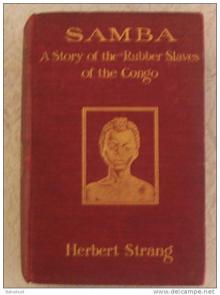 Samba: A Story of the Rubber Slaves of the Congo
Samba: A Story of the Rubber Slaves of the Congo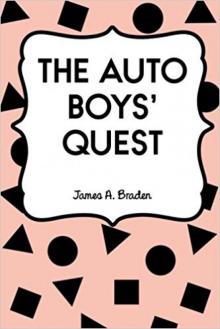 The Auto Boys' Quest
The Auto Boys' Quest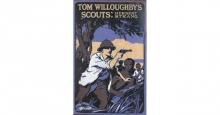 Tom Willoughby's Scouts: A Story of the War in German East Africa
Tom Willoughby's Scouts: A Story of the War in German East Africa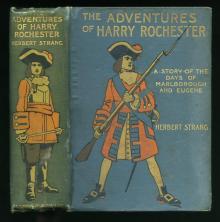 The Adventures of Harry Rochester: A Tale of the Days of Marlborough and Eugene
The Adventures of Harry Rochester: A Tale of the Days of Marlborough and Eugene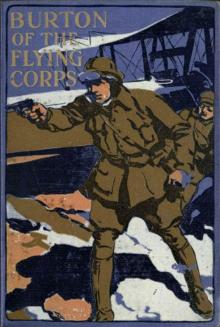 Fighting with French: A Tale of the New Army
Fighting with French: A Tale of the New Army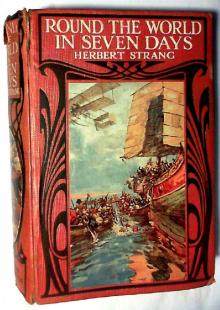 Round the World in Seven Days
Round the World in Seven Days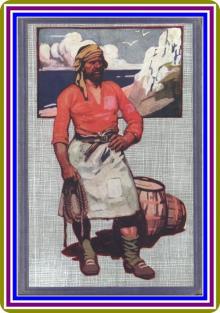 The Adventures of Dick Trevanion: A Story of Eighteen Hundred and Four
The Adventures of Dick Trevanion: A Story of Eighteen Hundred and Four